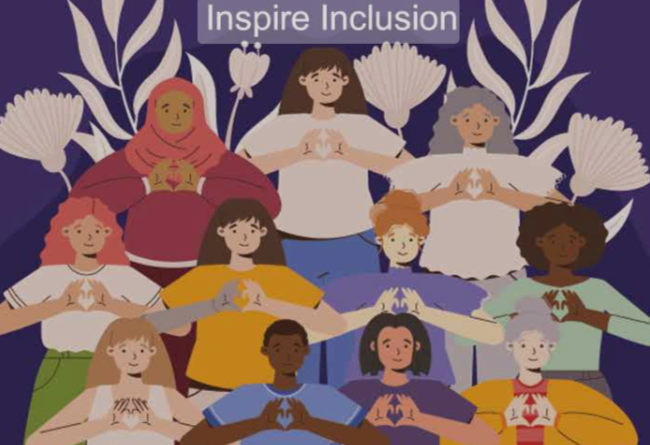Niraj Krishna

“Inspire Inclusion” is a reminder that creating an inclusive environment is not only about inviting women to the table but also about ensuring that they are heard, valued, and given the opportunity to contribute equally. Inspiring inclusion means so much more in today’s society and today’s workplace.
Every year, the purpose of celebrating International Women’s Day on March 8th is to recognize and honor the contributions of women. The campaign for International Women’s Day 2024 is called ‘Inspire Inclusion’. Its aim is to inspire others to understand and appreciate the inclusion of women. The theme for International Women’s Day 2024 is centered around ‘Count Us In: Accelerating Gender Equality through Economic Empowerment’. By investing in women, we can bring about change and accelerate progress towards a healthier, safer, and more equitable world for everyone. This theme aligns with the priority agenda of the 68th United Nations Commission on the Status of Women.
Very few of us understand the meaning of ‘Inspire Inclusion’. If we are motivated to understand the value of women, then it would be called ‘Inspire Inclusion’. The essence of this theme is to respect women and inspire others to do the same. This could be done by an individual, a group, or even by women themselves. It is essential to understand the value of women in building a better world.
Inclusion is not just a buzzword; it’s a fundamental aspect of a thriving society. It’s about embracing diversity in all its forms, whether it be race, ethnicity, gender, sexual orientation, religion, disability, or any other characteristic. Inspiring inclusion means creating environments where everyone feels valued, respected, and empowered to contribute their unique perspectives and talents.
Inclusion is so important because it cultivates a sense of belonging. When individuals feel included, they are more likely to be engaged, motivated, and loyal to their communities, workplaces, and societies. This sense of belonging enhances overall well-being and mental health, reducing feelings of isolation and loneliness. When people from diverse backgrounds come together, they bring with them a variety of perspectives, experiences, and ideas. This diversity of thought sparks innovation, leading to better problem-solving and more effective decision-making.
Moreover, inclusion fosters social cohesion and harmony. Inclusive societies are more peaceful and resilient, capable of addressing challenges collectively and building a brighter future for all.
We can start this with the people around us. Is there any task or responsibility in your vicinity where women are not participating? Then you can raise the question of why there are no women involved in that task. If there is bias against women, we should speak up and say that it is wrong. This will prevent others from doing the same, and it will also be a form of “inspired inclusion.”.
The woman is a divine creation, without which we cannot even imagine life. Along with being the goddess of motherhood, she is also the complement of man. Despite being so essential for society, people often fail to give women the respect they deserve. Sometimes women are kept enslaved, and sometimes their dignity is compromised in the name of household responsibilities. It’s like respect is not respected; it’s just a facade, and if a woman steps out, someone will snatch it away. The condition of women is so dire that even when they step out of their homes, deep down inside, they cannot separate the feeling that their honor is at risk. While some selected women are empowered, we say that today women empowerment is happening.
There is a woman in every man, and a man in every woman. This system is natural. The primary unit of society is the family, and the first teacher of a child is the mother. Napoleon once said, “Give me a hundred good mothers, and I will change the map of the country.” Today, when the face of humanity has lost its compassion, when violence is increasing due to unchecked behavior, and when the purpose of education is being disrupted, in such a scenario, the vigilance, responsibility, and shared participation of women and their power are essential elements for social development.
In the construction of familial, social, and national values, women have played a commendable and praiseworthy role. Considering women as the foundation stones of society, the famous philosopher Confucius said that only mothers can improve families and build cultured societies.
In Indian society, women are often referred to as ‘abla’ (weak). People misunderstand its meaning. ‘Abla’ does not mean weak or powerless. Its correct meaning is to rise above using strength. In Indian culture, women and men are given equal status.
“Yatra Naryastu Pujyante Ramante Tatra Devta” means where the deity resides in the place where women are worshiped. The existence of women like Gargi, Maitrai, Lilavati, Atri, and Anasuya in ancient times is proof that in the Vedic period, women had the full right to get a higher education and had an equal share in the work of their husbands. For this reason, she was named Ardhangini. In India, no festival or auspicious work is considered complete without a woman. An example of this is that when Lord Rama also performed the Ashwamedha Yagna, he made a gold idol of Sita ji in it. Tra Naryastu Pujyante Ramante Tatra Devta” means where the deity resides in the place where women are worshiped. The existence of women like Gargi, Maitrai, Lilavati, Atri, and Anasuya in ancient times is proof that in the Vedic period, women had the full right to get a higher education and had an equal share in the work of their husbands. For this reason, she was named Ardhangini. In India, no festival or auspicious work is considered complete without a woman. An example of this is that when Lord Rama also performed the Ashwamedha Yagna, he made a gold idol of Sita ji in it.
This glorious state of women was there before the domination of Muslims in the country. The times are changing. The lives of the Hindus became insecure when they were defeated by the Muslims, and the women had to protect their dignity. My own area of work had to be confined to the boundary wall of Kewat. Even in this age of darkness, this great land of India gave birth to lalanas like Tara, Kalavati, Durgavati, Karunavati, Liladevi, Ahilyabai, and Lakshmibai, who named the Indian woman Ujyal by her virtues.
I want to ask those women’s organizations how it happened that the women who emerged in the flames of the freedom struggle suddenly became apolitical. Why did the women who were considered important participants in politics disappear from the political scene after independence? Does women’s consciousness change only through political participation? Did our freedom struggle change women’s consciousness? Did the communal violence during the partition of India contribute to the depoliticization of women’s consciousness? Did India’s partition lay the groundwork for the depoliticization of political politics? Did it lead to the communalization of women’s consciousness? Why didn’t women’s organizations immediately work to keep women politically awake after independence? Why did political parties ignore women’s awakening immediately after independence? Satisfactory answers to these questions have not yet been found.
Today, a new word, ‘women empowerment’, is creating a buzz in the Hindi lexicon. There’s a lot of noise about ‘liberating women from societal shackles’, ’empowering women, and making them equal to men’. In a country where womanhood has been considered a form of power and glorified as Adi Shakti, Kali, and Durga, the demand for women’s empowerment seems somewhat peculiar.
The meaning of women’s empowerment is not merely empowering women. It’s not feminism either. It doesn’t mean imitating men; these are all misconceptions. The straightforward meaning of women’s empowerment is that women and men are equal in this world, and this equality is innate. Under women’s empowerment, no woman wants anything from any man or society because she refuses to accept that men are her “masters.” It’s not a challenge; it’s not a power struggle. It’s an awakening that both men and women are humans and have equal rights in society.
Many people understand “empowerment” as making women powerful from being weak, but this perception is entirely wrong. The meaning of “empowerment” is that the basic rights that belong to us, i.e., equal participation in social structures, should be granted to us.
Women’s empowerment doesn’t aim to challenge men from their positions; rather, it’s a mindset that, since we are all equal, we don’t need anything from men just because we are women. We don’t need any lines that glorify their actions and say, ‘You’ve done such a great job, and you deserve this award because we want to push women forward.’ This is a violation of women’s fundamental rights. It’s an insult to them.
The need to perceive the agility and vitality of women through the lens of gender-sensitive consciousness is crucial. Only then will a new dimension be added to their recognition, and only then will the significance of Women’s Day be fully realized. Today, it is increasingly echoed from various platforms worldwide that to empower women, they should be given equal rights in all fields like men. In line with this, the whole world recognizes March 8 as International Women’s Day to uphold the sentiment of empowerment among women globally and to ensure the preservation of their rights.
In conclusion, motivating incorporation isn’t an ethical basic; it’s fundamental for building a more fair, affluent, and agreeable world. By advancing mindfulness, making secure spaces, empowering assorted representation, cultivating allyship, and leading by example, we are all able to play a part in cultivating a culture of consideration from each perspective of life. Together, let’s celebrate our contrasts, grasp our shared humankind, and work towards a future where everybody feels esteemed, regarded, and included.


